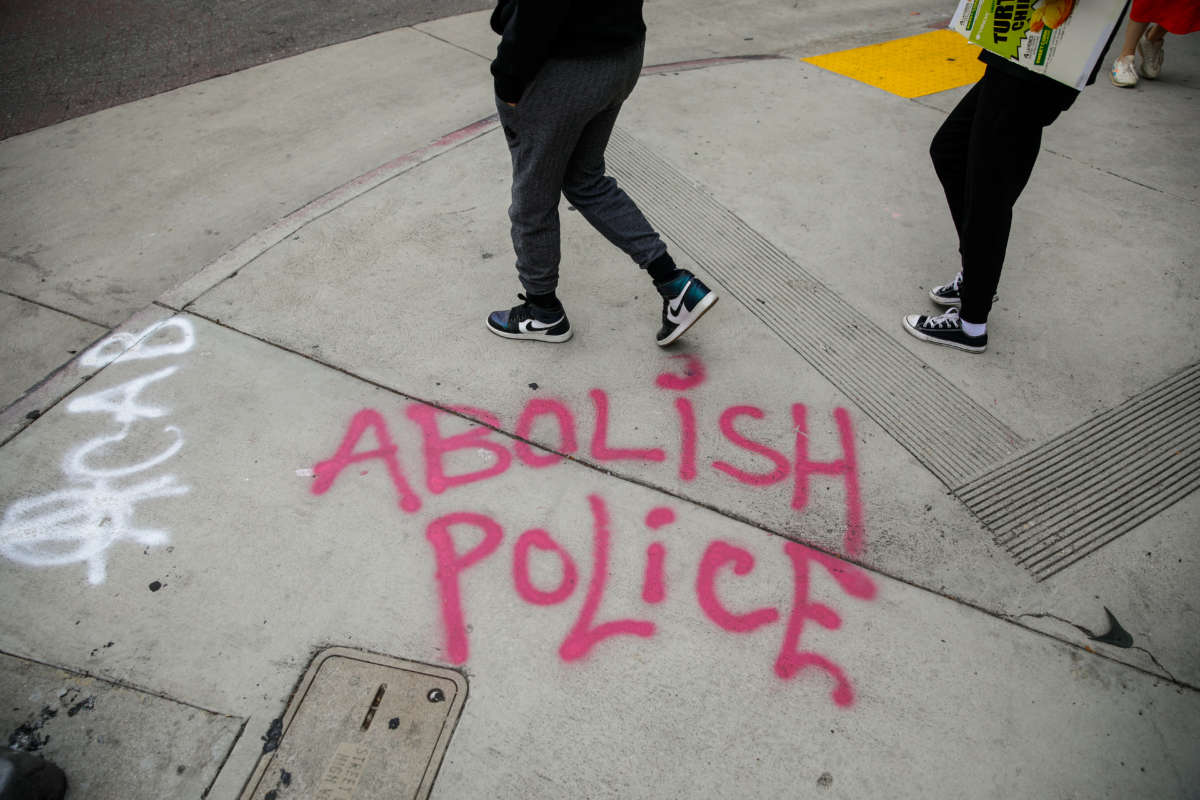Part of the Series
The Road to Abolition
Did you know that Truthout is a nonprofit and independently funded by readers like you? If you value what we do, please support our work with a donation.
For many of us, this current moment is all too reminiscent of 2016, following the deaths of Philando Castile, Alton Sterling and Korryn Gaines, when it seemed like social media had nothing to share but Black death. However, instead of calls for increased police training, revised use of force policies and diversity in hiring, a new and important call has taken hold — defunding the police.
This could be because, for all intents and purposes, Minneapolis had a reformed police department. The city had developed implicit bias training and community outreach initiatives in order to “build trust.” They’d revised their use of force policies, implemented de-escalation training as well as early intervention systems to identify potentially “troubled” officers and a requirement for officers to intervene if they witnessed improper use of force. Multiple years and millions of dollars later, what has the result been? Derek Chauvin, an officer with at least 15 conduct complaints, kneeling on George Floyd’s neck for almost nine minutes as he pleaded that he couldn’t breathe while three other officers assisted.
There has been a reckoning with why these initiatives failed in the first place — because policing is not broken. This anti-Black violence is exactly what it was designed to do.
Now the call for defunding the police has reached mainstream consciousness, but something has been lost in translation, for some pundits and politicians. In a conversation with a friend recently, she provided me with a very important reminder: When it was threatened with decreased budget allocations due to a shortfall in taxes, Missouri’s Ferguson Police Department didn’t transform into a progressive entity — it simply funded itself by preying on Black residents through fines and fees. I think we know how this story ends.
It is not enough to reduce police departments’ funding. We must dismantle police departments and utterly abolish their function in society so that their pleas for funding are nonsensical.
The abolition of police is not a new idea. Black feminist theorists and activists like Angela Davis, Mariame Kaba and Ruth Wilson Gilmore, and organizations like Critical Resistance and INCITE! (to name only a few) have been calling for the abolition of the carceral state in all its forms for decades.
As the abolitionists leading the current uprisings have reminded us, abolition is not just a divestment from policing, but the creation and resourcing of fundamentally different priorities. Police abolition could look like Tanisha Anderson being met with community-based support instead of the police officers who killed her. Police abolition could look like city workers replacing Philando Castile’s brake light and Walter Scott receiving mediation for how to best handle his unpaid child support. Police abolition would mean that selling loose cigarettes and CDs, switching lanes without signaling, possessing a potentially fraudulent $20 bill, being Black and trans, and sleeping in your own bed would no longer be a death sentence for Black people in the U.S. In the words of Derecka Purnell, “Rather than re-center police as a public good, the nation must become good and public.”
To be clear, police abolition does not mean a lack of accountability for those who cause harm. Instead, it entails an understanding that police and prisons do not only disproportionately kill Black, Indigenous and Latinx communities, but has also done little to keep anyone safe.
Detractors from police abolition always point to the same argument — what of violent murderers and rapists? In response, I have a very simplistic argument: Over the last few decades, the United States has built the most pervasive prison-industrial complex the world has ever seen and murder and rape still persist. Not only does violent crime persist, but less than 60 percent of all murders are solved. The vast majority of sexual assault are not reported to police and of the few that are, only 0.5 percent result in convictions. Survivors of violence and families of victims often report feeling like the criminal “justice” system has failed and traumatized them. We already live in a society that does not value the victims of violence, especially when those victims are Black and Indigenous. Don’t we want that to change?
Alternatives to the prison-industrial complex are playing out every day in our communities. But their growth and multiplication won’t happen overnight. This process will require us to reimagine what safety, justice and freedom look like. And, it will also require resources — the very monetary resources now allocated to police departments. We must defund the police — as an essential first step.
A terrifying moment. We appeal for your support.
In the last weeks, we have witnessed an authoritarian assault on communities in Minnesota and across the nation.
The need for truthful, grassroots reporting is urgent at this cataclysmic historical moment. Yet, Trump-aligned billionaires and other allies have taken over many legacy media outlets — the culmination of a decades-long campaign to place control of the narrative into the hands of the political right.
We refuse to let Trump’s blatant propaganda machine go unchecked. Untethered to corporate ownership or advertisers, Truthout remains fearless in our reporting and our determination to use journalism as a tool for justice.
But we need your help just to fund our basic expenses. Over 80 percent of Truthout’s funding comes from small individual donations from our community of readers, and over a third of our total budget is supported by recurring monthly donors.
Truthout has launched a fundraiser to add 379 new monthly donors in the next 6 days. Whether you can make a small monthly donation or a larger one-time gift, Truthout only works with your support.
